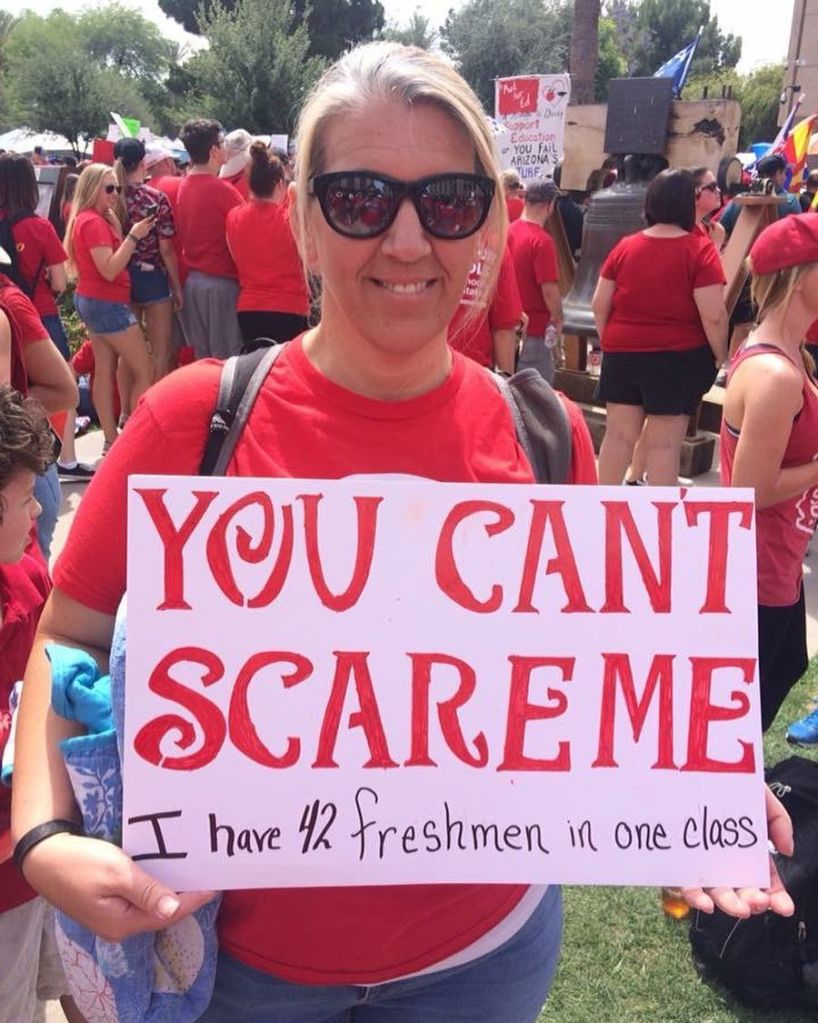I should start by saying this: My dad was a Teamster, a union guy all his working life. At our house, the union protected the little guy—made sure he was paid fairly, had a benefit package, kept him from spiteful bosses (plenty of those).
When I became a public school teacher, and thus automatically a union member–this was Michigan, flagship union state, in the 1970s–my dad (who didn’t finish high school) was reassured. The union would protect me. He also wouldn’t let me park the first car I purchased on my extravagant $9050 salary, a Toyota Corolla, in the driveway. He had his non-negotiables, and one of them was Made in America.
It came as a surprise to me to learn just how differently teachers in other states viewed the union. A friend who grew up in South Carolina told me teachers there tended to see themselves as ‘above’ a union—to them, he said, the kinds of people who need a union are chicken-processors, or folks who work at the textile mill. People without college degrees. Low-class.
Working in education policy, one of my side hustles was with a dynamic woman who created and ran a professional development non-profit for educators. She began work as a teacher (in the South, in a right-to-work state). She had a distaste for unions. She asked me once: Wouldn’t you like to negotiate your own salary? Weren’t you aware, as a teacher doing side work in professional development, that you could be making three times as much in the private sector?
I told her that I deserved three times my pay–but so do lots of other people in social services and social justice work. I said it was a shame that our country prizes money above service.
But that was a lousy answer. It was the polite martyrdom that teachers are prone to: I know how critical I am in the community, and how much skill I bring to my work, but go ahead—take advantage of my sincere desire to make my community a better place.
If the pandemic has taught us anything, it’s that education still depends on teachers. Good teachers. Teachers who can roll with the big waves and tides of fortune. And those teachers, who work every day in isolation from their colleagues, need to be organized.
Over 40 years of union membership, I saw the best and worst of teacher unionism, up close and personal. Unions are organizations, so—like, say, churches—even organizations founded on the right moral goals and principles sometimes go off the rails, usually because of weak or even corrupt leadership. But the good always far outweighed the bad.
So I was pleased to hear Joe Biden give a shout-out to unions in his first press conference. Part of that might just be Scranton Joe relying on his empathy for the working class. But union pension plans, the secure retirement strategy of millions of union workers, have been given some support in the recent stimulus package—even the Chamber of Commerce thought that was a good idea. And with a massive infrastructure-energy bill, we actually might see good union jobs come back. Wouldn’t that be great?
During the pandemic, snarling at teacher unions has become the refuge of the neo-liberals who feel bad about trashing grossly overworked teachers—the ones who understand that face to face schooling during a raging pandemic is dangerous. Teachers, the rhetoric goes, are noble and good, and doing their best. It’s the unions who are refusing to play nice and make things easier for working—or exhausted—parents.
That’s inaccurate, and a cheap shot. This is a truism, but—there is no daylight between ‘teachers’ and ‘the teachers union.’ Trying to faux-praise one while castigating the other is a needle you can’t thread, even in places where teacher unions barely have a toehold. Teachers need unions more than ever, right now.
If I were asked today why I was content to let the union negotiate my salary, this is what I would say:
I started work in a union shop/collective bargaining state, where my rights were always protected.
I knew how much I would make in five years, and how to guarantee a higher salary through additional education.
I knew that I wouldn’t lose my job if my principal decided he didn’t like me, but only if my conduct or teaching were substandard–and I knew what those standards were.
I knew that there were far more men teaching in my strong-union state than her no-real-union state, which positioned female teachers as second incomes and paid them as such.
I also knew that keeping teacher salaries low increased turnover, and experienced teachers were better and more effective than a merry-go-round of newbies.
For now, I’m stickin’ to the union.


Thanks, Nancy!! I always do enjoy your blogs, and this one especially touched a personal spot for me. Unions have been very important in my own family’s world, and also in my post-wedded life. It’s sad to see the things that have benefited so many now become maligned by the very people who would most stand to benefit by them now. Unions and Socialism have both become unspeakable words, and I am heartened by your honest and intelligent defense of both. Blog Away, my Friend!!
And have a wonderfully warm visit in Phoenix with your daughter. Perhaps when you return it will Be Spring here.🙏
Love, Julia
Sent from my iPad
>
LikeLike
Kind words from Julia mean a lot! Thanks, my friend.
LikeLike
My dad began working at Gillette Safety Razor Company sweeping the factory floor when I was a baby (it was a big step up from digging graves). By the time I began teaching, he had risen to management, but Gillette never unionized and my dad was fond of grilling me about why I needed a union to take my money (like you, my salary came in at about $9000).
We got paid every two weeks and it was my dad’s habit to ask me if I’d paid my rent (to him!) on payday. Our mayor had realized that if he held on to teacher paychecks over the weekend by not delivering them to schools before the end of the school day (no direct deposit back in the day), he could accrue interest until Monday. Dad asked me one Friday if I had paid my rent and I told him we hadn’t gotten our checks. He was astonished and declared that if he had to tell his employees their paycheck wasn’t coming on payday, he would have climbed out his office window on the seventh floor instead.
Now, he said, I understand why you need a union.
LikeLike
Great story. Unionized teachers have a million of ’em–reasons why the union protected them (or at least tried to). I find it incomprehensible that MI, once the flagship state of the UAW, got steamrollered into becoming a RTWT (Right to Work, but for Teachers, not other unionized public employees like cops, firefighters and prison guards) state. Hmmm. What IS the difference?
LikeLiked by 1 person
Does anyone have to ask why we need unions when there are teachers who work two (or more) jobs to make ends meet? Does anyone have to ask why we need unions when powerful forces joined together to try to force teachers back into unsafe classrooms? Teachers knew what is best for their students until someone in power decided they don’t. Teachers were praised for their selfless dedication until that dedication did not extend to risking their lives and the lives of their families and students. A collective voice is so important; it’s much harder to walk over thousands speaking as one.
LikeLiked by 1 person
Love my union!
They are there to protect me from unfair bosses and go above and beyond when it comes to informing me about educational news!
Linda
LikeLiked by 1 person